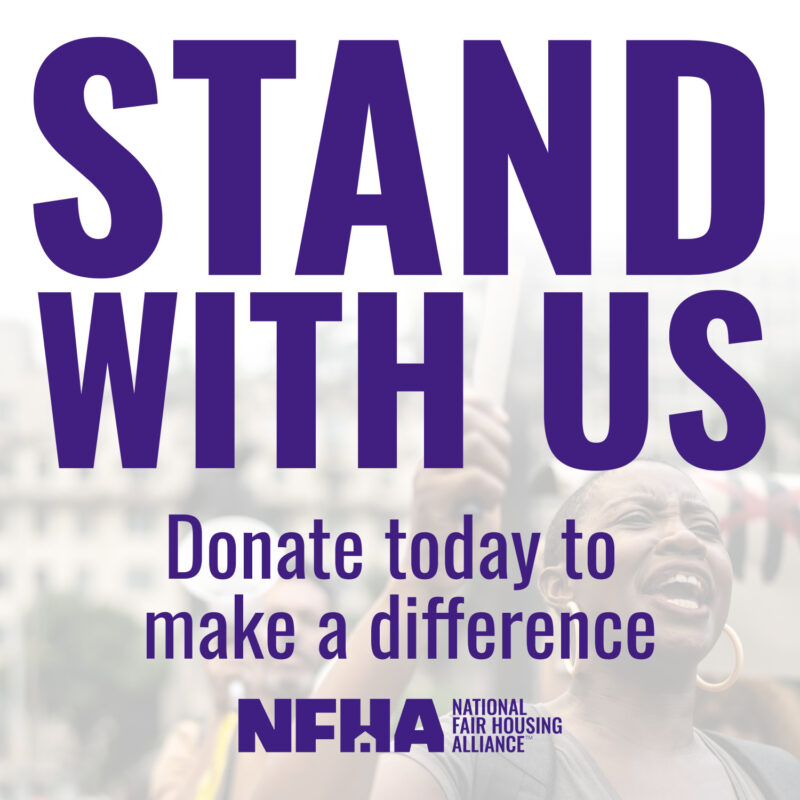New NFHA Report Reveals Highest Number of Housing Discrimination Complaints to Date
FOR IMMEDIATE RELEASE
August 8, 2023
Contact: Izzy Woodruff │ iwoodruff@nationalfairhousing.org
New NFHA Report Reveals Highest Number of Housing Discrimination Complaints to Date
Latest findings underscore the need for more robust funding for local fair housing enforcement organizations to create sustainability for non-profit private agencies obtaining relief for victims of housing discrimination
Washington, D.C. —The National Fair Housing Alliance (NFHA) released data today showing that the number of housing discrimination complaints rose to more than 33,000 nationwide last year, the highest on record. In a troubling turn, domestic violence related complaints saw a noticeable increase along with complaints based on source of income, according to new data published in the latest Fair Housing Trends Report.
There were 33,007 fair housing complaints received last year by private non-profit fair housing organizations (FHOs), the U.S. Department of Housing and Urban Development (HUD), Fair Housing Assistance Program (FHAP) agencies and the U.S. Department of Justice (DOJ), a 5.74 percent jump compared to 2021 when 31,216 complaints were filed. This represents the highest number of complaints ever reported in a single year.
These new findings show that housing discrimination is still affecting many people and communities. But even the unprecedented number of complaints don’t account for the many incidents of housing discrimination that fail to get reported at all due to fear of retaliation or eviction. In other cases, incidents of housing discrimination go undetected or unreported because they are difficult to identify or document.
“This year commemorates 55 years since the landmark Fair Housing Act became law. We have come a long way since then, but the findings of our latest Fair Housing Trends Report indicate that we still have a long way to go in dismantling unfair systems that are driving racial wealth and homeownership gaps, economic inequality, and structural barriers for people of color, people with disabilities, women, immigrants, certain religious groups, and LGBTQ+ individuals.” said Lisa Rice, President and CEO of NFHA. “It is especially concerning that the numbers are trending upward for discrimination complaints involving victims of domestic violence, who are often already burdened with navigating the legal system. Now, these women, men, and children, through no fault of their own, have to bear the consequences of an abuser impacting their ability to secure housing or remain housed.”
Connecticut is one of at least six states that have passed laws making victims of domestic violence a class of persons to be protected from discrimination. Because of the increased protections, fair housing advocates said reporting of instances of discrimination has improved.
“Additional state-level protections have expanded our reach in providing assistance to survivors of domestic violence in a variety of situations such as breaking a lease or transferring units, exceptions to credit policies, and eviction prevention,” said Pamela Heller, staff attorney for the Connecticut Fair Housing Center. “It’s another tool we can use to ensure equal access to housing and to secure safe and habitable conditions for our clients.”
NFHA has produced the Fair Housing Trends Report annually since the mid-1990s as part of its mission to expand access to fair housing and credit opportunities and ensure that all neighborhoods are well-resourced, resilient places of opportunity in which people can thrive. This year, NFHA also developed a new interactive web-based feature to help the public better visualize the Fair Housing Trends Report data. That feature can be accessed here.
The latest report critically underscores the need for federal, state, and local governments to prioritize increasing funds to support the agencies on the frontlines processing and investigating fair housing complaints and working to dismantle barriers and systems that impede progress for all people.
“Given the spike in reported housing complaints during the nation’s fair and affordable housing crisis, we must redouble our efforts to secure adequate resources for the organizations and agencies — on the local, state, and federal level — working to advance fair housing,” Rice added.
FHOs processed 73.94 percent of complaints, compared to 5.80 percent by HUD, 20.15 percent by FHAP agencies, and 0.11 percent by the DOJ. As the numbers show, private fair housing organizations are at the forefront of fair housing enforcement. They are in dire need of more funding and resources to continue their important work of investigating complaints, collecting data, providing fair housing counseling and education to consumers, and helping clients file complaints with appropriate authorities.
As in previous years, the latest findings show that discrimination based on disability accounted for the majority (53.26 percent) of complaints filed with FHOs, HUD, and FHAP agencies.
There were 2,490 complaints based on sex, the highest number recorded since NFHA began collecting such data in 2005. There was also a significant increase of 39.8 percent in complaints regarding source of income last year compared to the year before. And there was a spike in domestic violence complaints, with 289 reported domestic violence complaints last year, compared to 172 in 2021.
This report includes submissions from 86 NFHA member organizations, which are all either private non-profit fair housing organizations or fair housing programs of legal aid agencies. HUD’s 10 regional HUD offices and 77 state and local government agencies that participate in HUD’s FHAP program also provided data. In addition, the report contains information gathered from the DOJ.
Click here to read the full report. Those who believe they have experienced housing discrimination should file a report with their local fair housing agency, local or state government organization, and/or HUD.
###
The National Fair Housing Alliance (NFHA) is the country’s only national civil rights organization dedicated solely to eliminating all forms of housing and lending discrimination and ensuring equal opportunities for all people. As the trade association for over 170 fair housing and justice-centered organizations and individuals throughout the U.S. and its territories, NFHA works to dismantle longstanding barriers to equity and build diverse, inclusive, well-resourced communities.
